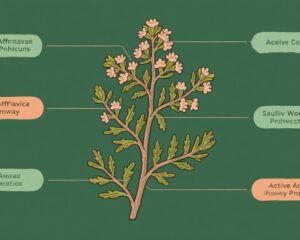What is Valerian?
photo from wikipedia
Valerian (Valeriana officinalis) is a perennial flowering plant belonging to the Valerianaceae family, widely distributed in North America, Europe, and Asia. Valerian root is known for its calming properties and contains various compounds, including essential oils, valerenic acid, gamma-aminobutyric acid (GABA), and alkaloids, which have been recognized in pharmacopeias across more than twenty countries, including China, Japan, the United States, the United Kingdom, Germany, France, and Italy. In China, it is commonly referred to by names such as “Chuan Xin Pai Cao,” “Lu Zi Cao,” “Gan Song,” and “Man Shan Xiang.” But what are the health benefits of Valerian, and how can it be used safely?
1. Promotes Sleep
Valerian has been dubbed the “herb of sleep” by Europeans as far back as 2500 years ago. The valerenic acid present in Valerian can effectively induce the secretion of neuropeptide S (NPS), shortening the activation process of the homologous receptor (NPSR). This triggers the mobilization of intracellular Ca2+, restoring active sleep, reducing sleep latency, shortening the time it takes to fall asleep, and enhancing the depth of sleep. Users often report waking up refreshed without experiencing a hangover effect.
2. Alleviates Anxiety and Depression
Valerian extract (valepotriates) contains valerenic acid and valerenol, compounds that enhance the response of the gamma-aminobutyric acid (GABA) receptors. These compounds alter the transport and release of the neurotransmitter GABA, inhibiting sympathetic neurons, and thereby alleviating symptoms of anxiety and depression. They also exhibit sedative and anticonvulsant effects.
3. Relieves Visceral Pain
Valerian essential oil and the sesquiterpenes found in Valerian help relieve smooth muscle spasms, which can alleviate gastric cramping and menstrual pain.
4. Exhibits Antibacterial and Antiviral Properties
The alkaloids in Valerian extract demonstrate antibacterial effects, while compounds like valerenic acid and dihydrovalerenic acid possess antiviral properties.
5. Traditional Chinese Medicine Effects
In Traditional Chinese Medicine, Valerian root is believed to calm the spirit, dispel wind-dampness, invigorate blood and Qi circulation, and relieve pain. It may be used for conditions such as palpitations with insomnia, manic depression, rheumatism, and injuries from falls.
6. How to Use Valerian
Valerian can be extracted and processed into various forms such as essential oil and capsules for topical or oral use. When purchasing, it is essential to check for the approval number from the relevant health department. Traditional preparation methods in TCM include decoctions, powders, and tinctures, which can be taken orally, applied externally, or used in compresses. It is always best to use Valerian under the guidance of a qualified practitioner.
7. Precautions When Using Valerian
Being a natural plant, Valerian is classified by the U.S. Food and Drug Administration (FDA) as GRAS (Generally Recognized As Safe), and its moderate use is generally considered safe. However, caution is advised:
- Valerian may adversely affect the neurological development of fetuses and young children; therefore, pregnant and breastfeeding women, as well as children under three years of age, should avoid its use.
- Avoid using Valerian with other sedatives, sleep aids, or supplements such as melatonin, and do not consume alcohol simultaneously, as combined effects could lead to central nervous system suppression and, in severe cases, death.
- Do not drive or operate heavy machinery while taking Valerian, as its sedative effects can impair judgment and reaction times, potentially leading to safety accidents.


